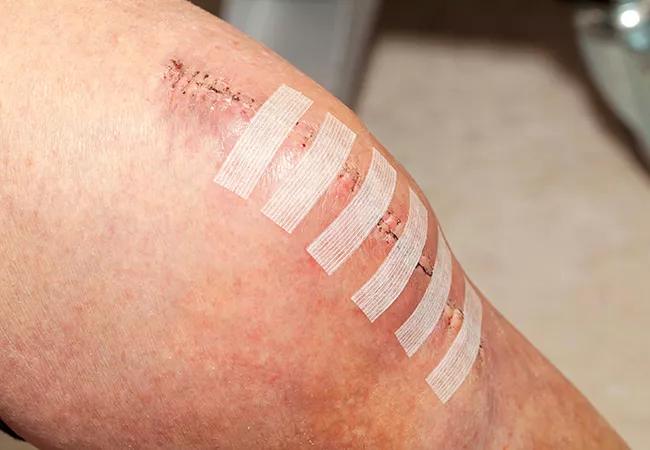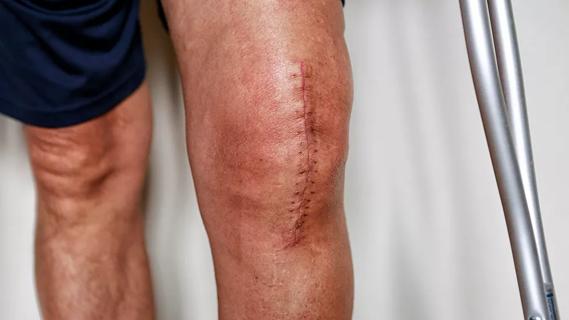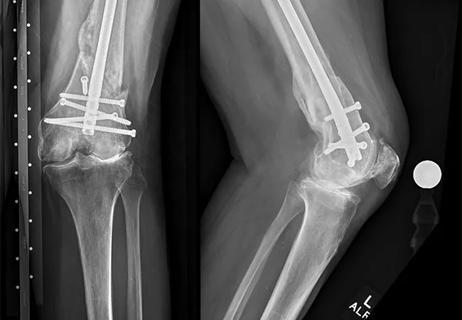Odds of major complication are low even for the unhealthiest patients

Improvements in surgical techniques and pain management, as well as Medicare’s removal of total knee arthroplasty (TKA) from its list of inpatient-only procedures in 2018, have led to increased interest in same-day discharge TKA.
Advertisement
Cleveland Clinic is a non-profit academic medical center. Advertising on our site helps support our mission. We do not endorse non-Cleveland Clinic products or services. Policy
“When I started residency in 2006, patients having TKA stayed in the hospital for three to four days, and 30% to 50% or more were discharged to rehab facilities,” says Michael Bloomfield, MD, an orthopaedic surgeon at Cleveland Clinic.
These figures have decreased significantly over the past five years, with average length of stay now just over one day and an estimated 90% of patients discharged home, according to Dr. Bloomfield.
“This is the natural evolution of trying to care for these patients more efficiently in the hospital,” he says.
Sending patients home the same day has substantial advantages, such as reducing costs, limiting patients’ exposure to disease, and decreasing use of hospital resources, which in turn frees up more beds, notes Dr. Bloomfield. However, it’s still unclear for which patients same-day discharge TKA is safe.
“Is there any increased risk? What criteria should we be using to establish who’s safe to go home and who would do better staying for a night or two?” asks Dr. Bloomfield. “The literature is fairly conflicting.”
To help answer these questions, Dr. Bloomfield and a Cleveland Clinic research team investigated whether patients are being appropriately selected for same-day discharge by comparing the 30-day complication rates of patients discharged the day of surgery versus patients discharged one or two days after surgery.
Researchers used the American College of Surgeons National Surgical Quality Improvement Program database to identify patients who had primary TKA from 2012 through 2018. Patients were matched according to morbidity probability, a combination of demographics, comorbidities and other preoperative factors. This resulted in a 1:1 match between 6,327 TKA patients who were discharged the same day and 6,327 TKA patients who stayed in the hospital for one or two days.
Advertisement
Researchers broke down the patient study population into quartiles based on morbidity probability. In each quartile, they assessed variables such as age, race, sex, body mass index, and history of smoking, diabetes mellitus and chronic obstructive pulmonary disease (COPD).
Next, the research team calculated the incidence of all complications (e.g., superficial surgical site infection, pneumonia, urinary tract infection) and major complications (e.g., unplanned intubation, pulmonary embolism, acute renal failure, cardiac arrest, sepsis) and then compared complication rates by quartile.
“For the healthiest 50% of patients undergoing a total knee arthroplasty and discharged the same day, there was no increased risk of any complication compared to patients who stayed in the hospital,” says Dr. Bloomfield.
Additionally, the first, second and third quartiles had no increased risk of major complications when they were discharged the same day. Even for the unhealthiest 25%, the odds of having a major complication were very low. The risk of a major complication in the healthiest 75% was around 1%. In the unhealthiest quarter, it was about 1.6%.
Based on these findings and his own practice, Dr. Bloomfield believes that at least half of patients having TKA reasonably could be considered for same-day discharge.
“If someone has heart failure, COPD or some other major systemic risk factor, I’m not going to send them home the same day,” he says. “But considering the overall low relative risk, for patients that don’t have serious health conditions, same-day discharge can be done without fearing worse outcomes. I hope that our study is reassuring.”
Advertisement
There are significant advantages to sending patients home quickly after TKA, Dr. Bloomfield points out. Yet, despite the incentives, there are patients who simply aren’t ideal candidates for same-day discharge.
“Our study reinforces that we should be doing due diligence and appropriately selecting patients for same-day discharge TKA,” says Dr. Bloomfield. “That requires stratifying risk and doing the right thing for each patient.”
Advertisement
Advertisement

Self-care may be just as effective for some patients

Most return to the same sport at the same level of intensity

More report a clinically meaningful change in function at 90 days compared to patients with lower BMI

How to diagnose and treat crystalline arthropathy after knee replacement

Special glasses allowed surgeon to see 3D models and anatomic data superimposed on surgical field

When procedure is performed by high-volume surgeons, outcomes are comparable to total knee replacement

Study findings warrant caution in patients at risk for DVT, cardiovascular issues and more

Robot assistance turns two-stage surgery into a single procedure